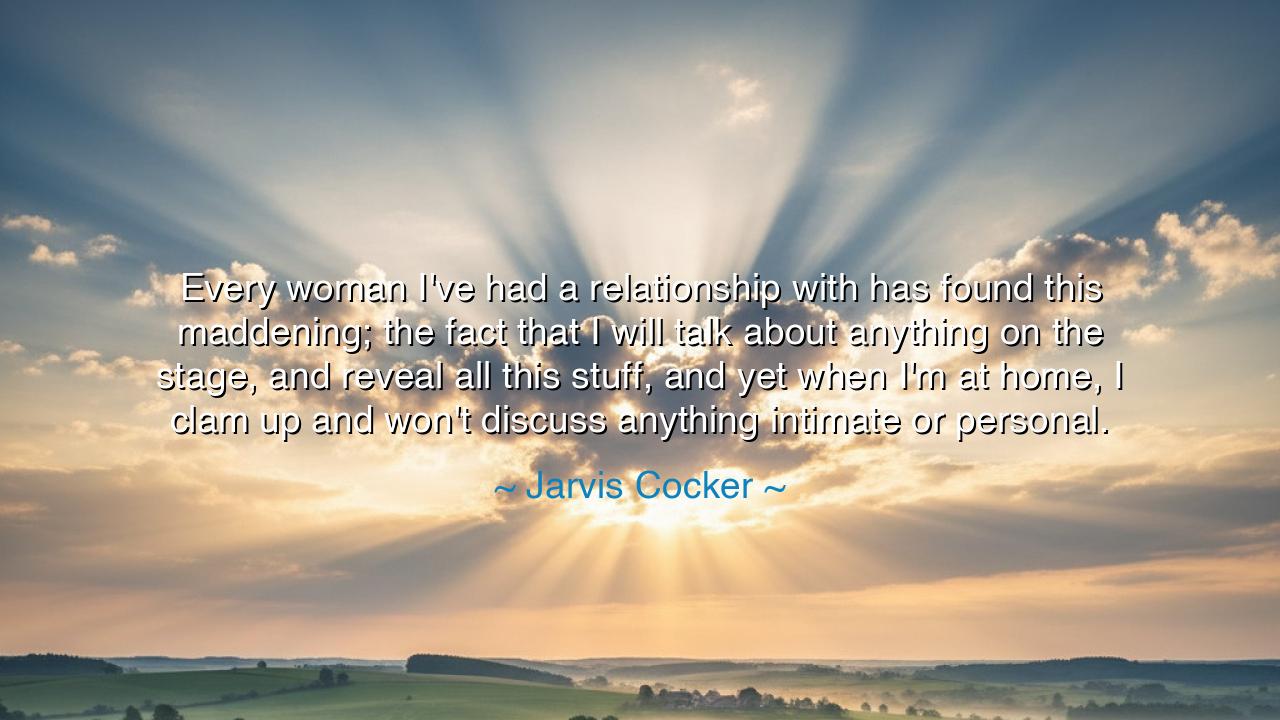
Every woman I've had a relationship with has found this
Every woman I've had a relationship with has found this maddening; the fact that I will talk about anything on the stage, and reveal all this stuff, and yet when I'm at home, I clam up and won't discuss anything intimate or personal.






Hearken, O children of the ages, to the words of Jarvis Cocker, who speaks with the voice of paradox and reflection: “Every woman I’ve had a relationship with has found this maddening; the fact that I will talk about anything on the stage, and reveal all this stuff, and yet when I am at home, I clam up and won’t discuss anything intimate or personal.” Here lies the ancient teaching that the soul often presents differently in public and in private, and that the heart’s mysteries are guarded even by those who reveal much to the world.
In the chronicles of old, the elders observed that human beings often possess dual realms of expression: one that engages the eyes and ears of many, and another that dwells in the sacred privacy of home and hearth. The stage, like the temple or agora, invites confession and storytelling, yet the inner sanctuary of the heart remains protected. Cocker’s words illuminate this timeless tension between outward transparency and inward reserve, showing how vulnerability is carefully chosen and guarded in the sacred spaces of intimacy.
The origin of this wisdom is ancient, whispered by poets, philosophers, and storytellers who understood the delicate balance of revelation and concealment. Across civilizations, it was known that those who reveal themselves to the public do not always reveal themselves to those closest to them. A relationship demands trust and patience, and it is often here, in the private sphere, that the deepest challenges of intimacy are encountered. Jarvis Cocker, in his modern voice, echoes this ageless insight: openness before the many does not guarantee openness before the one.
O seekers, understand that the art of intimacy requires the cultivation of patience, empathy, and respect. To observe another’s reticence is not to condemn it, but to honor the sacred nature of personal boundaries. The paradox of speaking freely on the stage yet clamming up at home is a lesson in the complexity of the human heart, revealing that connection is nurtured not only by disclosure, but by trust, understanding, and shared care over time.
Let this teaching endure, children of the future: the balance between public expression and private intimacy is a sacred mystery. Every relationship carries within it the task of honoring both revelation and restraint, of understanding that hearts may guard their deepest truths even as they illuminate the world. In patience, compassion, and awareness, the bonds of love and friendship find their enduring strength, bridging the spaces between what is shown and what is held sacred within.
If you wish, I can also craft a more poetic, ceremonial version, where the tension between stage and home, and between revelation and privacy, is depicted as a sacred dance of the soul. Would you like me to do that?






MDNguyen Tran Minh Duyen
This statement really made me think about the complexities of relationships. I can see how someone like Jarvis Cocker might feel more comfortable revealing intimate thoughts in front of a crowd rather than with a partner. Why do we hold back in relationships when we’re so willing to open up in other environments? Could it be about control, privacy, or simply not wanting to burden someone we love with too much vulnerability?
LPLy Phan
I feel like this quote captures something real about many people’s lives—how we present one version of ourselves to the world and another at home. Maybe it's easier to open up in front of an audience, where there’s less emotional risk. But at home, in close relationships, there’s a fear of judgment or vulnerability. Do we, as a society, expect too much openness from people, or is it normal to need that private space?
BNHuu Binh Nguyen
I totally get where he’s coming from. It’s fascinating how someone can be so open on stage and yet so closed off in private. Is it a defense mechanism? Maybe the vulnerability of being on stage is different because it’s part of his professional persona. Do you think that makes it harder for partners to connect with him on a deeper, more personal level? What does it say about the balance between public and private selves?
SVSoan Vu
This quote is really interesting. It seems like Jarvis Cocker is highlighting a common contradiction in many people—being open and vulnerable in one setting but closed off in another. I wonder, though, what makes him clam up at home? Is it because of fear or a desire to keep certain parts of himself private? Can we truly be open all the time, or is there a need for boundaries in personal relationships?